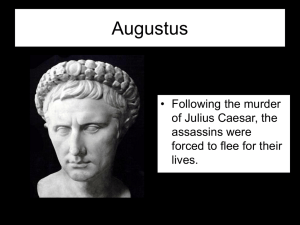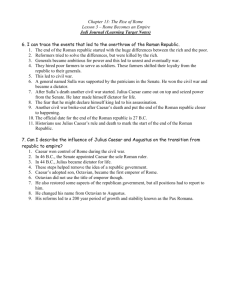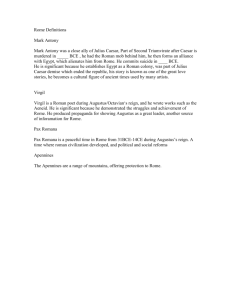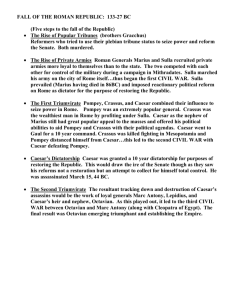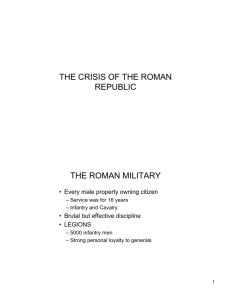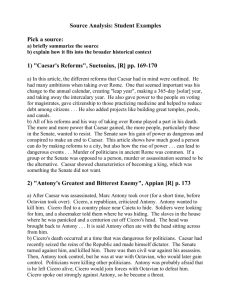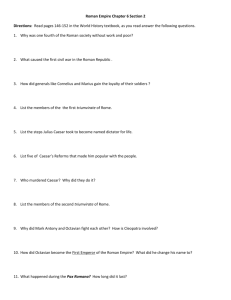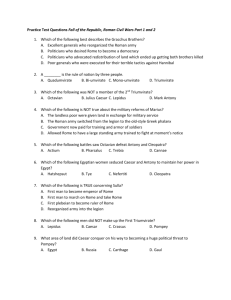CHAPTER 7 SECTION 3
advertisement
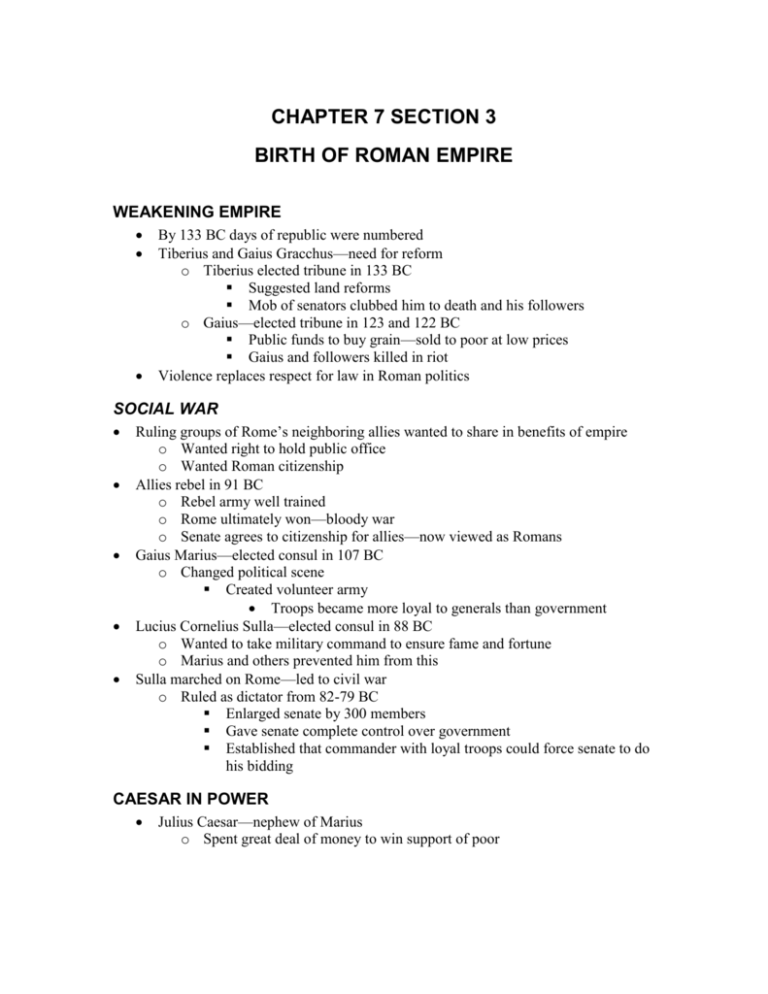
CHAPTER 7 SECTION 3 BIRTH OF ROMAN EMPIRE WEAKENING EMPIRE By 133 BC days of republic were numbered Tiberius and Gaius Gracchus—need for reform o Tiberius elected tribune in 133 BC Suggested land reforms Mob of senators clubbed him to death and his followers o Gaius—elected tribune in 123 and 122 BC Public funds to buy grain—sold to poor at low prices Gaius and followers killed in riot Violence replaces respect for law in Roman politics SOCIAL WAR Ruling groups of Rome’s neighboring allies wanted to share in benefits of empire o Wanted right to hold public office o Wanted Roman citizenship Allies rebel in 91 BC o Rebel army well trained o Rome ultimately won—bloody war o Senate agrees to citizenship for allies—now viewed as Romans Gaius Marius—elected consul in 107 BC o Changed political scene Created volunteer army Troops became more loyal to generals than government Lucius Cornelius Sulla—elected consul in 88 BC o Wanted to take military command to ensure fame and fortune o Marius and others prevented him from this Sulla marched on Rome—led to civil war o Ruled as dictator from 82-79 BC Enlarged senate by 300 members Gave senate complete control over government Established that commander with loyal troops could force senate to do his bidding CAESAR IN POWER Julius Caesar—nephew of Marius o Spent great deal of money to win support of poor FIRST TRIUMVIRATE In 60 BC Caesar joined with Gnaeus Pompey and Licinius Crassus in a political alliance Caesar becomes consul in 59 BC o Needed support of a loyal army Obtained command in Gaul During next 10 years brought Gaul under Roman rule Crassus dies in 53 BC Pompey appointed consul in 52 BC o Jealous of Caesar—orders him to return w/o his army Caesar marches towards Rome in 49 BC Crosses Rubicon River on Jan 10 Declares war on republic o Pompey flees to Greece o Caesar defeats Pompey and invades Egypt Appoints Cleopatra as ruler of Egypt o Returns to Rome in 46 BC In 44 BC declares himself dictator for life RULE OF CAESAR Increased size of Senate to 900 members Senators Gaius Cassius and Marcus Brutus and others conspire against Caesar March 15—“Ides of March” 44 BC o Caesar killed on steps of Senate ROMAN EMPIRE Octavian—Caesars appointed heir SECOND TRIUMVIRATE o Octavian—19 years old o Marc Antony—ally of Caesar o Lepidus—Caesar’s second in command Marc Antony forces Lepidus to retire Antony and Octavian divide Roman world o Antony the east o Octavian the west Octavian declares war on Antony o 31 BC naval battle at Actium Greece Octavian defeats Antony’s fleet o 30 BC Antony and Cleopatra commit suicide OCTAVIAN: THE FIRST AUGUSTUS Octavian appointed consul o Called himself “princeps”—1st citizen o 27 BC Senate gives him title Augustus or “Revered One” o Generally called first Roman emperor Began series of conquests that expand empire o From Spain to Syria o From Egypt to Rhine and Danube Rivers 9 BC Roman troops defeated by German tribes at Elbe River “Pax Romana”—Roman Peace o Lasted 200 years o Political system reduce powers of Senate, assemblies and magistrates PAX ROMANA EMPERORS Augustus dies in 15 AD o Next 54 years relatives of Julius Caesar ruled Rome—Julio Claudian Emperors Tiberius—14 -37 AD—adequate ruler Caligula—37-41 AD—brutal and insane Claudius—41-54 AD—conquered Britain; poisoned by wife Agrippina Nero—54-68 AD—killed himself No clear rule for selecting emperor AD 69- 4 different emperors ruled—supported by rival army leaders Flavian Emperors—69-96 AD o Vespasian – 69 -79 o Titus—79-81 o Domitian—81-96 5 Good Emperors o Ruled for almost 100 years Nerva—96-98 AD Trajan—98-117 AD Hadrian—117-138 AD Antonius Pius—138 -161 AD Marcus Aurelius—161- 180 AD Hadrian tried to Romanize colonies Marcus Aurelius defended empire against invasion
